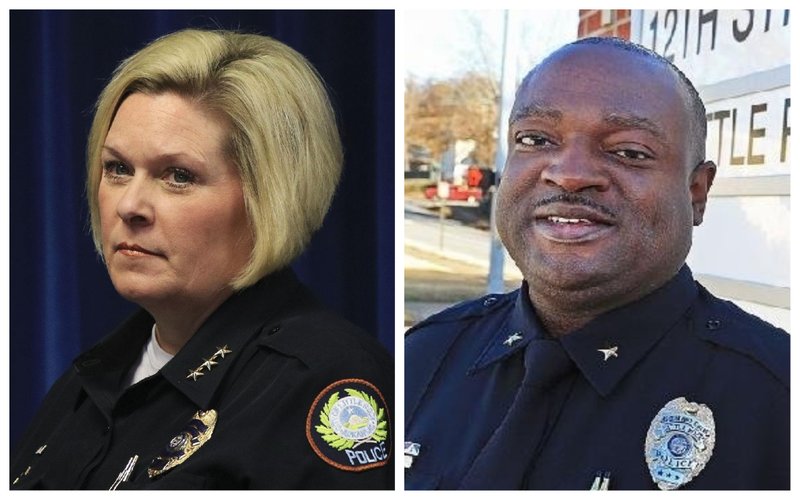Two of Little Rock's three assistant police chiefs have added their names to the list of applicants seeking to lead the department, the applicants said.
Assistant Chiefs Hayward Finks and Alice Fulk confirmed that they have submitted applications seeking to become Little Rock's new chief of police, a position that was vacated on Nov. 16 when former Chief Kenton Buckner left to become police chief in Syracuse, N.Y.
City Manager Bruce Moore named all three assistant chiefs to serve as interim chiefs on a rotating basis during the projected three-month search for a new police leader. Fulk was interim chief from Nov. 17 to Dec. 17. Finks took over on Dec. 18 and will continue through Jan. 18, when Assistant Chief Wayne Bewley will become interim chief for the final month.
Fulk confirmed her application Thursday. Finks announced his intention to apply in December. Bewley said in December that he would not apply for the position.
"I've been working for this since I hired on," Fulk said. "Ultimately, one way or another, I feel like I've tried to take every step I needed to take to be able to apply and be the best candidate for this job."
Finks declined to comment Thursday for this article.
The application information for the position was posted in mid-November, with a closing date of Jan. 1. The information says the person chosen for the position will oversee a department budget of $75.7 million and 594 sworn officers. The application information lists a maximum salary of $142,663.
The minimum requirements include a bachelor's degree in criminal justice, police science, public administration, business administration or a related area of study, 10 years of experience in law enforcement and a minimum of five years of managerial or administrative experience in law enforcement.
Finks started with the department in 1988 as a police cadet and has served in his current position as assistant chief since 2012. He served on the city's first gang unit to address violent crime in the 1990s and was the first officer assigned to the Alert Center as a community-oriented officer.
Finks was a captain and division commander for nine years before becoming the assistant chief.
As assistant chief of the field services bureau, Finks supervises the 12th Street Station Division, Southwest Division, Northwest Division and the Special Operations Division.
Finks has a bachelor of science degree in emergency services management from Bethel University and attended several law enforcement training programs, such as the U.S. Secret Service Dignitary Protective School and the FBI-Criminal Justice Institute Arkansas Leader program.
Fulk joined the department in 1992 and became the first female assistant chief of police in Little Rock Police Department's history when she was promoted in 2015.
Fulk held positions in investigations, patrol, training, records and support divisions before becoming the assistant chief of the department's executive bureau.
She graduated from the University of Arkansas at Little Rock with a bachelor's degree in criminal justice and from Webster University with a master's in human resource management. She has also received training from the Homeland Security Leadership Academy and Senior Management Institute for Police.
Fulk said she believes that any candidate hired for the chief job would face something of a learning curve but that her experience as assistant chief has in many ways prepared her for the job.
She said one of her first priorities as chief would be to hire a consulting company to perform an independent staffing study. Fulk said she supports the idea of increasing the size of the department but wants to ensure that those officers are going to the divisions that need them most.
"We've made a commitment to make patrol our priority and we've done that, but I think some of our support areas have gone bare-bones to make patrol our priority," Fulk said.
During her 30 days as interim chief, Fulk secured a partnership with Washington State University for the department to receive $25,000 worth of implicit bias training for free, she said.
"Being transparent is one thing the department has got to do," Fulk said. "I want to work on that community relationship right out of the gate."
The Counter Bias Training Simulation program will study the effect of implicit bias training on officers by reviewing dash camera footage and department complaints before and after the training, Fulk said.
"I'm going to work on that regardless," Fulk said. "If our department has the opportunity to get this training, I want us to have it. I think it's important for our relationship to the community, and I'm invested in this community and this city."
Metro on 01/04/2019
